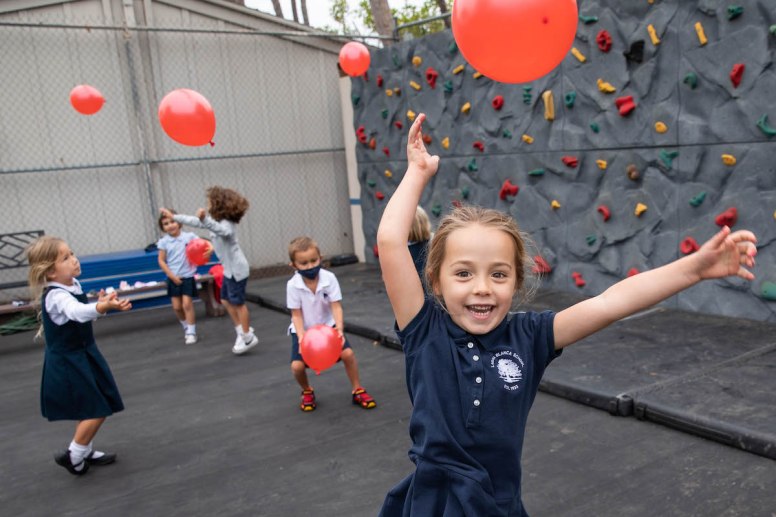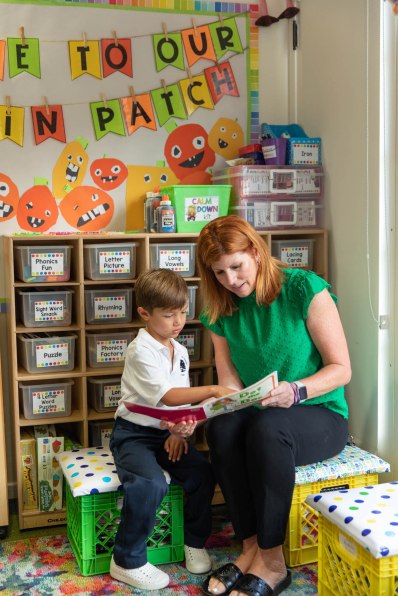How to Prepare Your Child
to Rock Kindergarten
Ready, Set, Go! Expert Tips
to Make Starting School a Success
By Leslie Dinaberg | November 10, 2022

Read all of the stories in our “Schools of Thought 2022” cover here.
Kindergarten begins a new and exciting chapter for both parents and children. Longtime Laguna Blanca kindergarten teacher Mieke Delwiche offers some valuable tips to help families prepare to start school. The most important thing is to have fun with learning, says the Carpinteria native, who has been teaching for nearly 20 years.
Social/Emotional Readiness

- Teach your child how to express their feelings if they do not like something.
- Learning to share and take turns: Play cooperative games with your child.
- Interacting with other children in an age-appropriate way: “Give your child opportunities to interact with other children in preschool or social groups or playdates,” she says. “Role-play different situations they might experience on the playground or at school. Help them find solutions for typical problems they might encounter.”
- Separating from parent or caregiver
- Focusing for five minutes or more when an adult is leading: “Give your child two- and three-step directions. For example: ‘Put the toy away, pick a book to read, and sit on the couch.’”
Self-Care
- Using the bathroom independently (be able to wipe oneself and pull clothing up and down independently)
- Washing hands
- Getting dressed independently (Bonus: tying shoes)
- Knowing their first and last name and age
Fine Motor Skills
- Using a pencil or crayons with some control
- Using scissors: “Show them how to hold and use scissors safely. Give your child old magazines or newspapers to cut up. Have them make a collage using scissors to cut out pictures and then glue them onto a piece of paper.”
- Making marks that look like letters: She suggests writing using all types of supplies, including fat crayons, window markers, outdoor chalk, colored pencils, and markers.
- Writing some of the letters in their name: “Work with your child to learn to write their name. Write in shaving cream, use chalk outside, paint letters with water and a paintbrush on your driveway or sidewalk. Write in the steam on your shower door or bathroom mirror!”
- Putting together a simple puzzle: Some additional ways to improve fine motor skills include building with blocks, stringing beads, playing with Play-Doh, and picking up small items — like cotton balls or uncooked pasta — with a clothespin, tweezers, or chopsticks.
Gross Motor Skills
- Standing on one foot for 10 seconds
- Mimicking movements accurately (Simon Says)
- Jumping sideways (hopscotch)
- Kicking a stationary ball
- “Draw a line on the ground for your child to walk on. Pretend it is a tightrope, a log over a creek, and a freeway, and have your child practice walking on the line in a way that mimics the scenario you give.”

Language Skills
- Speaking in complete sentences
- Using words to express needs and wants: Delwiche recommends role-playing. For example, “use stuffed animals to have conversations that help your child practice advocating for themselves or communicating their feelings.”
- Understanding and following two-step directions: Have your child help you prepare a meal or snack. Talk through the directions. “First, I am going to wash the apple. Next, I will cut the apple. Last, I will eat the apple.”
- Making comparisons and describing relationships between objects
- Some additional ways to improve language skills are to read with your child. Also, sing with your child: rhyming songs, silly songs, or even your favorite songs. Tell your child about your day and what you are doing. Then ask them questions about their day.
Academic Skills
Reading
- Enjoying listening to stories: Play games with rhyming words to help your child hear similar sounds in words. For example, “As you are going up the stairs, name one word that rhymes with ‘bin’ for each step as you go up. Nonsense words work too!”
- Reciting the alphabet and identifying some letters: “Make your child aware of the sound that each letter makes. Find items around the house that begin with the same sound and identify the letter that makes each sound. (‘Show me three items that start with the sound /s/.’) Use old magazines and newspapers to make letter collages. Have your child find pictures of things that start with each letter of the alphabet.”
- Recognizing and trying to write their own name
- Drawing a picture to help express an idea
- Identifying the cover of a book and which way the pages turn: “Run your finger under the words as you read to your child to help them learn that words go from left to right and top to bottom.”

Math
- Counting from one to 10: Count throughout the day. “How many crackers are you eating for a snack? How many socks are you taking out of the dryer? You can even count the number of apples you are bagging at the grocery store.”
- Recognizing and naming basic shapes and colors: Delwiche suggests pointing out numbers and things you see in your environment and having your child name them on a regular basis; playing games in which your child finds objects of particular colors and shapes around the house; and playing I Spy.
- Understanding “more than” and “less than”: Some additional ways to improve math skills are by making number collages. “Write the number five on a piece of paper and have your child cut out five items from a magazine and glue those items to the number-five poster. Repeat!” In addition, Delwiche says “Games like Chutes and Ladders, Hi Ho! Cherry-O, Candy Land, Avalanche, and Memory are perfect for reinforcing math skills and practicing graceful winning and losing.”
- Make learning and the idea of attending school something fun. “Your child will benefit greatly from the special time you are spending with them,” says Delwiche. “Play games. Read books. Talk to each other. And LAUGH! Learning means so much more when it is enjoyable.”
See lagunablanca.org.





You must be logged in to post a comment.